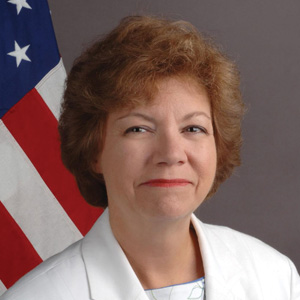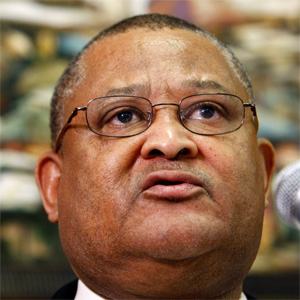|
|
|
Industry
Can The KP Be Saved?
By Ricci Dipshan

|
| Gillian Milovanovic |

|
| Welile Nhlapo |

|
| Farai Maguwu |
Outgoing Kimberley Process (KP) Chair Gillian Milovanovic closed one controversial chapter in her year-long reign by praising Zimbabwe’s “good faith effort” at the organization’s recent plenary session and announcing that the country was no longer under special monitoring and was free to export its
KP-certified diamonds without restriction. A second controversy during her term regarding calls for redefining conflict diamonds — and broadening its scope beyond diamonds used to fund civil conflicts — will be passed along to the incoming KP chair, Welile Nhlapo of South Africa, for continuing discussion. Both issues were addressed as the KP hosted its plenary session in Washington, D.C., from November
27 to 30.
KP members have been reluctant to liberalize the organization’s policies and practices beyond what they consider its original, basic mission. The organization also has been reluctant to take any political stance that might alienate its more conservative members. In addition, the unwieldy nature of the organization and its requirements that all decisions be unanimous makes it difficult to get consensus on any issue that comes
before it.
Critics of the KP, and there are many, felt that having Milovanovic, a U.S. ambassador, at the helm of the organization they considered ineffectual at times was a window of opportunity to increase the organization’s decisiveness and clout in the international community and to enhance its reputation for effectively policing the world’s diamond supply. Some of those same critics feel that transitioning the chair to South Africa will reduce that opportunity.
In highlighting the accomplishments of her term, Milovanovic cited a customs seminar conducted in West Africa, the launch of electronic mailing lists for each sector of the supply chain, an Enforcement Conference in Washington, D.C., and procedures for sharing fraudulent certificates within the KP and with the World Customs Organization. She also praised the expansion and overhaul of the
KP website, including the addition of the Development and Assistance section, which “brings together those seeking technical assistance with other KP participants or observers in a position to offer their expertise, all in a no-fault environment.”
The plenary session also approved another advance: the creation of an administrative support mechanism (ASM), under the direction of the World Diamond Council (WDC),
to help provide continuity and consistency by delivering“logistic, organization and communications support to the KP on an ongoing basis.” Eli Izhakoff, WDC president, said the council will be supported in its work by a global cooperative that will include India’s Gem and Jewellery Export Promotion Council (GJEPC), the Israel Diamond Institute (IDI), the Antwerp World Diamond Centre (AWDC) and the Diamond House of the Government of Ghana. The WDC’s role with the ASM was approved for one year, starting on January 1, 2013. The plenary also affirmed restrictions on individuals working in the ASM from engaging in any KP committee work.
Despite the successes cited by Milovanovic, the twin issues of certifying Zimbabwe’s diamonds and revisiting the conflict diamonds definition have overshadowed the other efforts of the KP in the year of her chairmanship. She asserted that Zimbabwe had completed what was required of it and its KP monitoring team had originally only
been approved for a specific period of time anyway, but various nongovernmental organizations (NGOs) allege that the country still has serious problems with transparency in its diamond revenues.
“Zimbabwe was reintegrated in Kinshasa in 2011 with a regime of monitoring, which was voted for a period of one year,” Milovanovic said. “Over the course of that year, Zimbabwe put in a significant good faith effort — it did, in the opinion of the monitors who went to Zimbabwe on repeated occasions, put in good effort — and did achieve
most of the things it needed to achieve and in some cases, did better than one could have hoped for.”
While declaring that “the special monitoring regime is no longer in effect” for Zimbabwe, Milovanovic noted that the process the KP placed upon Zimbabwe had given the country “a good record on which to base itself.” She added that good governance set in Zimbabwe during this year was already paying tangible dividends, including the country’s “willingness to abide by such things as access to Marange fields by NGOs.”
The handling of Zimbabwe’s compliance, Milovanovic explained, showed that “the Kimberley Process has demonstrated it can act and do something concrete and do it on a nonpunitive and developmental and assisting manner. What it means is the same as it has meant before — the KP as a result of this monitoring has determined which sites are fully compliant with the KP, and in terms of Zimbabwe being eligible to issue KP certificates, they are able to do so.”
For Zimbabwe and its diamond industry, approval by the KP comes at a critical time. The country plans to invest another $50 million by the end of 2013 in its diamond operations, including the Diamond Mining Corporation (DMC), half of which is owned
by the government’s Zimbabwe Mining Development Corporation (ZMDC). This comes on top of the $40 million already invested. This is projected to more than triple the company’s production.
Although KP civil society member Partnership Africa Canada (PAC) accepted the
KP’s stance on Zimbabwe and its admittance into a number of KP groups, such as the Working Group on Monitoring, the Committee on Rules and Procedures and the Working Group of Diamond Experts, it still has reservations about the nation’s handling of its diamond revenue.
“We recognize the agreement on Zimbabwe, but we have concerns about revenue transparency,” said Alan Martin, director of research for PAC. “Lost diamond revenue is a real problem.” Martin also criticized the KP for its limited focus with regard to Zimbabwe. “We are troubled by the fact that the KP recognizes but fails to enshrine transparency and good governance.”
Martin’s view was shared by Farai Maguwu, Zimbabwean diamond expert, human rights activist and founder of the Zimbabwe-based NGO Center for Research & Development. “The KP is happy and satisfied that all issues relating to Zimbabwe have been addressed. In my view, there ought to be some connection between the KP compliance and revenue transparency,” said Maguwu. “While this is regarded as a nonissue, I believe the KP
ought to ensure that diamond revenues are properly accounted for. Reconciling diamond production, exports, sales and revenues will end suspicion, speculation and mistrust, which, if not handled properly, can result in violent conflict.”
Milovanovic respectfully disagreed with PAC’s criticism of the KP. “There are a number of things that Alan Martin has said that perhaps approach some as extremely negative, but there are a number of things that are simply a matter of fact — revenue transparency discussions are not a part of the Kimberley Process,” she said. “Our intention has been to recognize that the KP is not going to do everything,” Milovanovic added. “In reality, it’s not an organization — it’s a process, and its capacities are limited.”
Part of the role of the KP, Milovanovic said, was to “bring together other organizations to cooperate with issues outside of the mandate of the KP. Some aspects are specifically the responsibility of the Kimberley Process and some the responsibility of others.” And while diamond revenue transparency is important, she said, “there are a range of organizations in existence that are working on this problem.”
Addressing the unfinished business of a new definition for conflict diamonds, Milovanovic declared that she did not “see that as a failing. We moved an organization whose members were not ready to discuss the conflict diamond definition at all because they saw no point to it, to an organization where members were prepared to discuss it. Suffice to say we have agreed that a discussion of the definition of the conflict diamond will continue under the South African presidency. Ultimately, we had a lot of conversations, but were not able to reach consensus.”
The issue in coming up with a new definition, Milovanovic explained, had to do with the inherently large and complex nature of the KP. “There was simply not enough time to bring everybody — 80 countries and industry groups and civil society groups — together and come up with and negotiate a new definition.”
The chair also reiterated that with the new definition, “The focus is exclusively on the issue of conflict, and conflict that is related to diamonds — it’s not on general human rights issues, it’s not on the revenue transparency issues and it’s not on environmental degradation or child labor. This is not to say that KP members do not think these things are important,” she added, noting that the group can only work within its mandate. “We have a domain in which we work.”
The failure to agree on a new definition of conflict diamonds was unwelcome news to the NGOs attending the plenary. “We are very disappointed in the lack of a new conflict diamond definition and mostly in the way the Kimberley Process has been unwilling and unable to adopt new language,” said Martin. “For us, this means that the Kimberley Process is not the first word on conflict diamonds. Going forward, we are going to be looking for other forums such as the Organisation for Economic Co-operation and Development (OECD) to make progress on this issue.”
When the KP meets again under its 2013 chairmanship headed by South Africa, it will have a much different makeup and tone than it had under Milovanovic. The body, for example, endorsed the admission of several new countries, including Panama, Kazakhstan, Cambodia and Cameroon to its ranks. And while the group has not appointed a vice chair for 2013, Milovanovic noted that, “China did advance its bid to become vice chair and indicated its willingness to be considered for 2013.”
Incoming chair Nhlapo thanked Milovanovic for handing over a “heavy task but with some issues resolved from the progress she has made,” and declared that he plans to build upon her work. But Nhlapo also stressed the need for the KP to stay within the bounds of its mandate and mission. “In our endeavor to try to make a contribution toward the solutions of conflicts, we have to understand our role. We need to be careful not to be overzealous of what we can do,” Nhlapo said, while noting that responsibility for the maintenance of the peace and security lies with the United Nations (UN) Security Council. “The UN has recognized through resolutions of the Security Council and the General Assembly the role of the KP in terms of complementing and adding value to the efforts being made to resolve these conflicts.”
Given South Africa’s stance on many heated KP issues, some believe that under its chairmanship, the body will not make any important breakthroughs on controversial issues. “Because South Africa, which has very conservative views about reforming the KP, is the next chair, much was expected from the U.S. regarding the KP reform before handing over the chairmanship to South Africa. In 2013, we are likely to see a lull in the KP reform agenda,” said Maguwu. Article from the Rapaport Magazine - December 2012. To subscribe click here.
|
|

|
|